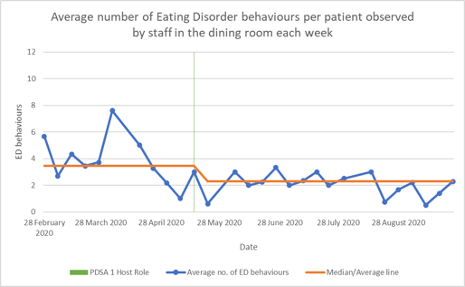Cotswold House Oxford dining room project
Objectives and Concerns
Concerns
Mealtimes form a core part of patient treatment that occurs six times daily (three main meals and three snacks). Historically on the unit, the dining room has been an area identified as difficult for staff and patients. The stressful nature of being in the dining room is raised repeatedly by patients in weekly clinical team meetings and staff meetings.
The impact of this was high levels of distress and anxiety experienced by both staff and patients, effect on wellbeing and sometimes barriers to forming therapeutic relationships. An observed effect of the levels of distress and anxiety experienced by patients was a high number of eating disorder behaviours exhibited at mealtimes, which are maintaining factors for eating disorders.
Objectives
- To improve the dining room experience for patients and staff.
- To connect the dining room as a part of therapeutic treatment to the I-CBTE model of care being implemented across the ward.
Aim
To reduce eating disordered behaviours at mealtimes in Cotswold House by 50% by 1st March 2021
About this project
Work was conducted to try and better understand the problems in the dining room, this included 5 days observation of the dining room at meal and snack times, conversations with patients and staff, surveys and team and community meetings. This information was used to co-produce the driver diagram with patients and staff and choose the first test of change idea: introducing the host role.
Overall purpose of the host role is to direct the flow of the dining room and be present in the dining room from the start of the meal or snack to the end of service. To support patients to be seated during the meal/snack and minimise interruptions.
Outcomes
Together staff and patients developed a checklist of the most common eating disordered behaviours around and during mealtimes, which were then completed for each patient at one lunchtime each week. Baseline data was gathered for 10 weeks before the host role was introduced. The run chart below shows a sustained improvement in eating disorder behaviours after the introduction of the host role, a 35% reduction towards the project aim.
The next test of change has been identified as the ‘Newcomers Guide to the main dining room’. This will be a written guide introduced during induction of staff. This is linked back to the driver of consistent staff approaches and is based on the idea that simplifying and standardising is a reliable and sustainable method of change. The patients continue to be involved and are working on content, compiling strategies that are helpful in the dining room, before, during and afterwards.
Non-urgent advice: Further information
Local project leads
- Lucy Gardner, Dietician
- Ellen Tutisani, Modern Matron
QI project support
- Dr David Hunt, Researcher for Improvement
- Hayley Trueman, Improvement Lead
Page last reviewed: 16 August, 2022


